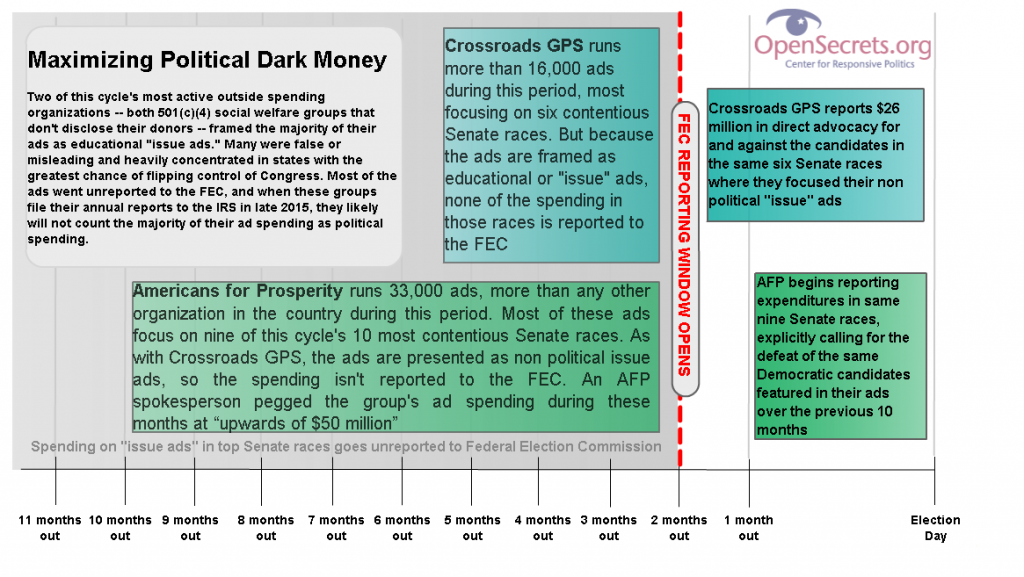This post first appeared at Center for Responsive Politics.

Americans for Tax Reform’s Grover Norquist. (Photo: Gage Skidmore/flickr CC 2.0)
New tax filings from two of the most politically active 501(c)(4)s in the country show once again the groups’ dizzying climbs and plunges in revenue depending on whether it’s an election year.
In 2013, Americans for Tax Reform — the iconic anti-tax nonprofit organization headed by Grover Norquist — brought in just under $4.3 million, according to the Form 990 the group filed with the IRS this week. That’s about one-seventh of the $30.9 million in revenues it reported the previous year, when there was a presidential election in the offing. The gap is even steeper than in the previous two years: In 2011, ATR received about $4 million in grants and contributions, compared with about $12.4 million in the election year 2010.
ATR received nearly 73 percent of its $4.3 million from 65 donors giving more than $5,000. More than half came from donors giving $50,000 or more.
Crossroads GPS’ plunge was even more precipitous. Tax documents obtained by the Center for Public Integrity show that group’s revenue falling from $180 million in 2012 to around $3.4 million, a loss of more than 98 percent.
What the recent documents don’t show is any repayment of funds by ATR to Crossroads GPS, the group spearheaded by Republican operative Karl Rove that gave ATR most of its revenue in 2012. Not that anyone expected otherwise; this is a dog-bites-man story. But it does call into question representations made by “dark money” groups like these about how political they are — and also about how diligently they attempt to ensure that their gifts to other organizations aren’t used for partisan politics.
Under IRS rules, the primary purpose of 501(c)(4) “social welfare” organizations, which are not required to disclose their donors to the public, cannot be political. The IRS has never given “primary” a hard definition, so many organizations have interpreted it to mean that politics should be kept to less than 50 percent of a group’s overall activity.
In 2012, the year that Crossroads provided the lion’s share of its funding, ATR told the Federal Election Commission it spent nearly $15.8 million on “independent expenditures” — that is, direct advocacy for and against specific candidates. As OpenSecrets blog first reported, that amounted to more than half of the total $31 million that ATR told the IRS it spent that year.
Moreover, since the grant from Crossroads GPS made up 86 percent of ATR’s revenues that year, most of the money spent by ATR on political activity had to have been Crossroads’ money. Crossroads had already come close to spending about half of its own resources on politics, intending for its grants to other groups to fulfill its “social welfare” mandate. But by underwriting almost all of ATR’s budget, Crossroads, in effect, amplified and expanded its own political spending. And that’s to say nothing of Crossroads other grants to politically active groups.
All this happened despite the fact that in 2012, Crossroads GPS claimed to have instituted more stringent requirements for how it selects grantees and how those grantees can use the funds. In its 2012 tax filing, the group told the IRS that it “carefully evaluates the missions and activities of recipient organizations prior to making any grants to ensure that funds are used only for 501(c)(4) exempt purposes of recognized tax-exempt section 501(c)(4) and 501(c)(6) organizations.”
Crossroads also said in that year’s 990 that all grants were “accompanied by a letter of transmittal stating that the funds are to be used only for 501(c)(4) exempt purposes, and not for political expenditures, consistent with the organization’s tax-exempt mission.” How that squares with ATR’s use of its grant from Crossroads is unclear.
When ATR filed its 2012 Form 990 with the IRS, it performed a little alchemy by wrapping about $6 million in political ad spending into a larger $27.6 million it said was used for “advertising and promotion.” For comparison, in the off-years of 2011 and 2009, ATR spent $59,281 and $495,013 respectively on advertising and promotion.
Questions about the two organizations’ numbers have lingered for months. OpenSecrets blog noted the relationship, and ProPublica did soon after. The liberal watchdog group CREW filed complaints with the IRS and DOJ about the discrepancies in ATR’s tax and FEC filings. And as recently as two months ago, The New York Times’s Tom Edsall specifically asked Crossroads spokesman Paul Lindsay about the rigors of the group’s oversight of grantees in light of its grant to ATR.
Lindsay’s response: “We have implemented stricter due diligence…this election cycle.” Crossroads never said it would require post hoc accountability for its grantees, only that it was conducting evaluations before the grants were given.
Both Crossroads GPS and ATR were contacted by OpenSecrets blog for comment on whether repayment of some of the 2012 grant had been discussed or some other arrangement made; we also asked whether either group had heard from the IRS about the use of the 2012 grant or about ATR’s apparent overspending on politics that year. Neither group responded.
Marcus Owens, an attorney who was formerly head of the agency’s Exempt Organizations division, notes that the language GPS used in making assurances to the IRS didn’t include any explanation of “how the inappropriate activity, i.e. ‘political expenditures,’ will be defined or what will, in fact, ensue if the terms of the transmittal letter are not followed.”
However, he said, “Certainly the ATR and GPS situation would historically have likely attracted IRS attention.”
One thing to note: Crossroads GPS has been waiting for more than four years for exempt status from the IRS, and at one point was slated to have its request denied. The IRS targeting scandal may have saved Crossroads from that fate, but it remains in a sort of purgatory.
Still, even an organization that engages heavily in campaign money laundering and significant political advocacy can be recognized as tax-exempt by the IRS. Whether or not Crossroads falls victim to its own notoriety, the reality is that the most politically active 501(c) organizations have already snared the IRS’ seal of approval for their activities.



